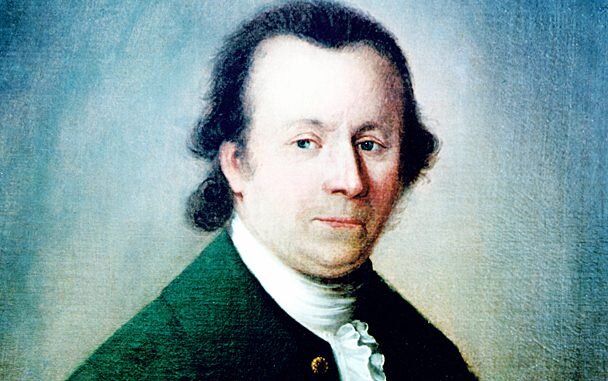
Button Gwinnett
Georgia
Born in the rural lands of southwest England in 1732, Button Gwinnett strove to make his living by way of the sea. His father was an Anglican vicar and his mother came from a family of prominence in Herefordshire, north of London. Mr. Gwinnett, later in life, would leave the Anglican Church and become a congregationalist. His interests led him to apprentice with a merchant in Bristol and become an exporter thereafter, as well as a husband to Miss Ann Bourne. Unfortunately, it did not go well for him. He incurred great debt. His ship was seized and sold to settle his arrears.
Hoping his luck would turn, he led his family to Charleston in 1765. After trading for a few years in South Carolina, he moved onto Georgia. It was here he bought a 36 square mile island off the coast of Georgia near the port town of Sunbury. He established a plantation utilizing the island’s vast acreage. In 1772, he purchased property in St. John’s parish (present day Liberty County). Again, his business ventures turned into failure and much of his property was seized the following year. He was permitted, however, to live in his house for the remainder of his life.
His failings in business did not affect his reputation though. He was appointed a justice of the peace and later was elected to the Georgia General Assembly. He had developed an interest in colonial matters upon moving to Georgia. Also, an introduction to Lyman Hall, also a signer of the Declaration, spurred his interest. Once contentions with the crown began in 1764, Mr. Gwinnett believed the colonies would have little success in achieving the concessions they desired. Several factors influenced his thinking. One was the sheer might of Great Britain. The other being his continued connection to the country of his birth through family who lived there.
He was finally convinced in the worthiness of the fight for liberty in 1775 by his friend, Mr. Hall. He was appointed to the Continental Congress and voted for Richard Henry Lee’s resolution for independence on July 2nd. He signed the Declaration on August 2nd.
He returned to Georgia with the intent of serving as general of the Georgia troops for the Continental Army. He was met with disappointment, however, as his rival Lachlan McIntosh was given the role due to prior military victories. The two continued to feud over the next year plus. One feud came about when Button Gwinnet was president of the Georgia assembly. He had assumed the position due to the death of Archibald Bulloch, the former president. He was effectively the state’s governor and the commander in chief of Georgia troops.
President Gwinnet received a letter from John Hancock informing him of the treasonous acts of General McIntosh’s brother, George. Pres. Gwinnet ordered Gen. McIntosh to arrest his own brother, which he did. He also ordered the general to carry out a military expedition that ended in failure due to inadequate planning and ineffective leadership. Both men blamed the other publicly for the outcome. An inquest took place and Mr. Gwinnett was exonerated. Tensions escalated even more when on May 1, 1777, Gen. McIntosh denounced President Gwinnet in a meeting of the Georgia Assembly labeling him a “a scoundrel and a lying rascal.” This precipitated a duel in which both men were wounded, but only one survived his wounds.
Button Gwinnett, a man of English birth and a “noble and commanding appearance” died on May 19, 1777. Sadly, he suffered lethally from a relational failure. He lived to be 45 years of age.


